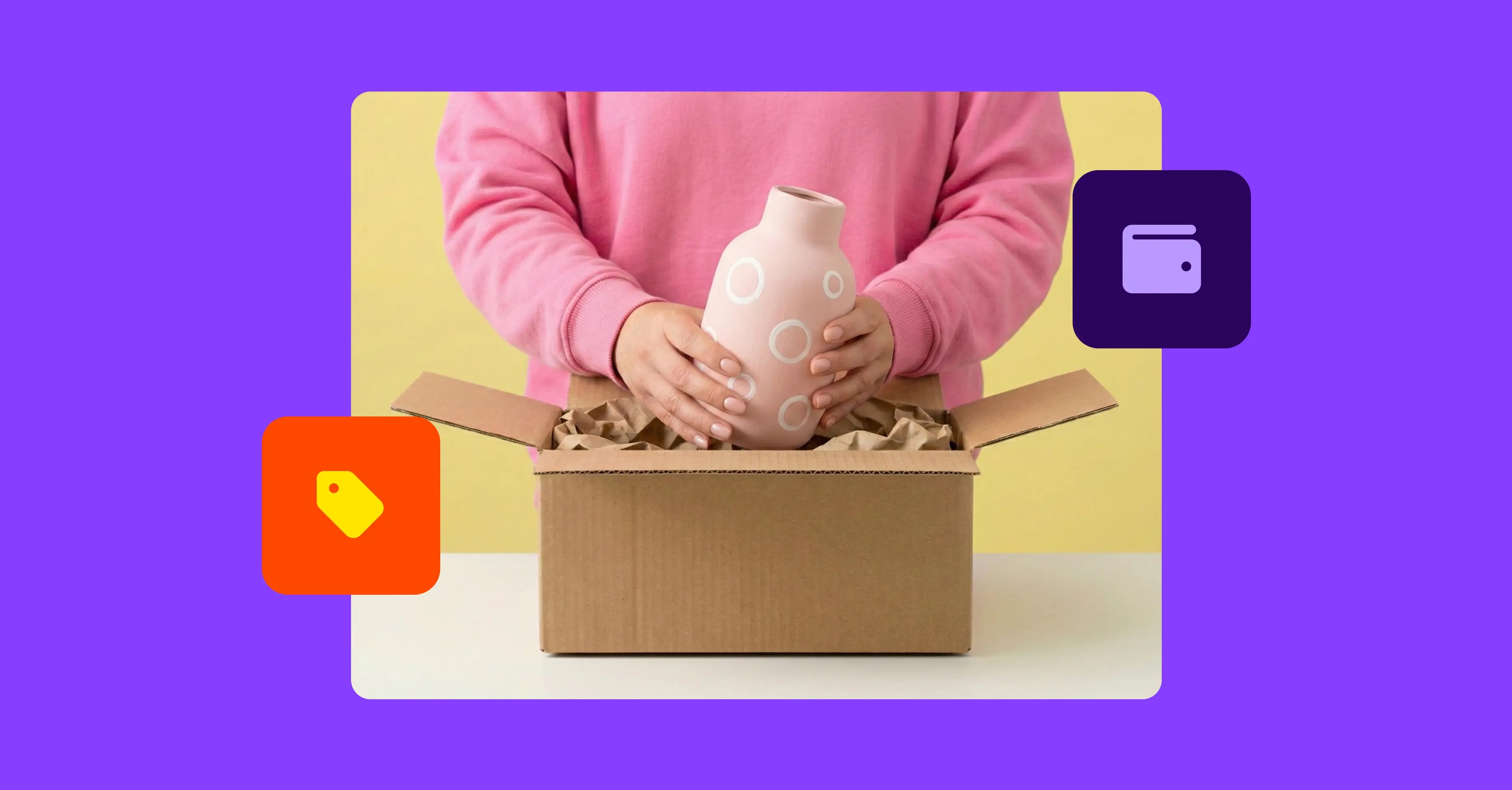If you have a successful storefront on eBay or Amazon, you might have thought about expanding to your own, standalone WooCommerce store. It may seem a bit overwhelming, especially after you’ve invested time and money into getting where you are right now.
But it’s worth it.
Yes, Amazon and eBay come with a host of benefits like a built-in audience and brand recognition. But a WooCommerce store will help you provide more product offerings, build your brand, and, ultimately, grow your business.
You can even integrate WooCommerce with your existing eBay or Amazon store seamlessly, so your business can benefit from both existing marketplaces and a standalone online store.
Here are just a few ways that a WooCommerce store will help you grow:
1. Make more money
↑ Volver al principioLet’s face it – we all want our profit margins to be as high as possible. The higher our margins are, the more money we take home at the end of the day.
If you sell on Amazon or eBay, you’re familiar with the various fees they charge each time you list or sell a product. The exact amounts vary based on what subscription plan you have, what products you’re listing, any promotions you may use, etc. Here’s a quick breakdown:
eBay charges (for a store subscription):
- Monthly subscription fees – starting at $4.95 per month
- Listing fees after monthly free listings are used – as much as 30 cents per listing
- Final value fees after your product sells – as much as 10%
So if a product sells on eBay for $100.00, you may have to pay up to $10.30 of that back to eBay, plus your monthly subscription fee. That may not seem like a lot at first, but when you’re regularly paying 10% of your income to a third party, it adds up very quickly.
Amazon charges (for a professional seller):
- Monthly subscription fees – $39.99 per month
- Referral fees – varies based on product category, but 15% on average
- Variable closing fees for media items – $1.35 per book, movie, video game, etc.
On that same $100 product, you may be paying $15.00 to Amazon, plus the monthly subscription fee. Again, 15% of your income adds up!
By starting a standalone WooCommerce store, you won’t need to worry about those fees. There are still overhead costs involved – hosting and domain names, for example – but WooCommerce itself is free and you won’t need to pay any listing fees or percentage of sales. You can expect much higher profit margins!
2. Maintain full ownership
↑ Volver al principioWith an Amazon or eBay store, your business is completely dependent on their platforms, technology, and executive decisions.
What happens if Amazon or eBay decides to shut down your store? That’s definitely a possibility and they don’t even need to provide you with a reason. If that’s your only source of income, you’ll be left floundering, trying to figure out another way to sell your products.
That seems like the worst-case scenario, but consider these possibilities:
- They could raise their fees and prices at any time.
- They could change their selling terms and conditions.
- They could change their search algorithms, making it harder for customers to find your products.
With a standalone store, you have full control. You’re not reliant upon a third party’s decision.
And, of course, if you want to maintain your successful eBay or Amazon store, your own website would provide both an additional income stream and a fallback should anything change with the other platforms.

3. Build a brand
↑ Volver al principioBuilding a brand is important for any business. Good branding establishes credibility, quality, and experience. It sets your products apart and keeps customers coming back time and time again.
While eBay and Amazon do allow some customization, you are limited as to what you can change. You can add custom images, logos, headers, and text, but most stores end up looking about the same. It’s very difficult to make yours really stand out.
Building a WooCommerce store allows you to showcase your brand’s personality! Create beautiful photo galleries, highlight your team members and tell their stories, use video backgrounds, add fun animation and custom illustrations, build interactive elements, and more. You can create anything that you want – the sky’s the limit!
There’s more to your brand story than just design, as well. It’s important that you provide the best possible experience for your customers. With your own store, you can install customer service plugins that allow you to respond to questions and problems, set up searchable FAQ pages, and provide a variety of contact methods that make it easy for customers to get in touch with you. You can also integrate social feeds that show your products in action.
4. Decide your own terms
↑ Volver al principioWhile you do have some control over terms and conditions on Amazon and eBay, you are limited in many ways. In the end, you’re reliant upon their policies.
For example, on eBay, you can decide that you don’t accept returns. However, if a buyer claims that the item they received was not as you described, eBay makes the final decision on a refund.
Of course, it’s important that you make ethical decisions as a business owner. Writing accurate descriptions and delivering high-quality products is key to success. But there are customers that will try to take advantage of your company and receive items for free. Having full control over your responses, refunds, shipping, and other policies allows you to make decisions for yourself.

5. Add additional functionality
eBay and Amazon both provide basic eCommerce functionality but there are definitely a lot of constraints. WooCommerce has virtually unlimited options, especially with their ever-growing extension database. Here are just a few features you can add to your WooCommerce store:
Sell subscription boxes. While Amazon does allow subscription boxes, eBay doesn’t currently provide that functionality. WooCommerce allows you to accept recurring weekly, monthly, or yearly payments with signup fees, free trials, and more.
Allow for customizations. Again, this is a feature available on Amazon but not on eBay. WooCommerce supports customizations of all kinds: create custom t-shirts, add monograms to products or design custom cards. Add on personalization fields like dropdowns, text areas, checkboxes, and sample images.
Accept a variety of payment types. Accept virtually any payment gateway you’d like rather than being dependent on eBay and Amazon’s limited options. Stripe, Square, PayPal, and Authorize.net are just a few of the built-in options, or create custom APIs to integrate with other, less common gateways.
Add a measurement calculator. Configure a pricing calculator based on dimensions, square footage, volume, or weight submitted by the user. This is particularly useful for flooring, wallpaper, frames, and similar products.
Bundle products. Sell a group of related products together as a package deal. Allow customers to add products to an existing bundle. This is a great way to upsell!
Sell memberships. Build an entire membership system with drip content that can tie into your existing products. For example, if someone purchases a meal kit subscription box, they may also get recipe videos each month on your membership platform.
Keep customers updated. Blogging is a valuable way to answer customer questions, connect with them, share your story, provide tips, and grow your brand. Since WooCommerce is built on WordPress, you can start blogging right away and reach your customers.
Learn about additional WooCommerce extensions.
6. Market more effectively
↑ Volver al principioWith a standalone WooCommerce store, you have the ability to collect customer data and use it more successfully. eBay and Amazon have some marketing capabilities, like email marketing and online advertising, but you’re very limited with what you can do and what you can include in marketing materials.
For example, while you can send follow-up emails and coupons to existing customers, you have very few options to reach site visitors who haven’t yet made a purchase. When it comes down to it, eBay and Amazon own your customer data and you have limited access.
However, with a WooCommerce store, you have the ability to collect data and use it for marketing purposes. Here are a few ways that you can market to potential and existing customers:
- Abandoned cart emails. Send emails or target ads to people who added products to their cart and left your site. Offer free shipping or a coupon to increase their chances of making a purchase.
- Remarketing. Remarketing ads allow you to reach your previous store visitors as they browse other sites. While Amazon does offer a form of remarketing, it’s nowhere near what Google and Facebook offer. With a standalone WooCommerce store, you can track your site visitors and use Google and Facebook’s advertising capabilities to send ads to the people most likely to purchase your products.
- Cross-sells and upsells. WooCommerce offers more advanced ways to upsell and cross-sell to your customers. Automatically suggest related products on individual product pages or your cart and checkout pages. You can even suggest items that they looked at but didn’t add to their cart.
- Marketing based on specific actions. For example, send emails to customers with coupons related to products they’ve previously purchased. You can also send thank you emails, coupons, or free shipping codes to recent, first-time, or repeat customers. This leads to more effective and successful marketing.
- Facebook lookalike audiences. Send ads to people that are similar to existing customers using lookalike audiences. You can create these using your own email list or from information gathered when you install the Facebook Pixel on your site.
And, of course, accessing more customer data helps you understand more about your audience, their preferences, and their actions. This can help you make decisions about pricing, website layouts, product descriptions, product offerings, and more.

7. Gain more loyal customers
↑ Volver al principioWhile eBay and Amazon are an excellent way to gain new customers thanks to their built-in audiences, it’s much more challenging to cultivate repeat customers. Because, let’s face it, these shoppers are typically loyal to Amazon and eBay first.
Especially in the case of eBay, customers are often there to find the best deals. So if they run across a product that’s similar to yours at a better price, they’re likely to purchase that one instead. In fact, Amazon and eBay even send out marketing emails to their customers with recommended products that compete with yours.
With your own website, however, your potential customers aren’t presented with an array of competing products. You have the opportunity to connect with them on a deeper level and share your brand story. They’re more likely to understand the value of your products and become loyal, repeat customers.
Get started with WooCommerce
↑ Volver al principioWooCommerce has made connecting your eBay or Amazon store a seamless process with Amazon and eBay Integration for WooCommerce. You can match up products on your existing marketplace storefronts to products on your new store and sync inventory, pricing, and more.
Once you’ve set up your WooCommerce store (you can find great documentation here), download and install the extension and connect your store. Here are some of the great features you’ll find:
- Link existing Amazon and eBay products to items on your WooCommerce store.
- Create new Amazon and eBay listings individually or in bulk.
- Set pricing rules, fulfillment rules, and product details for Amazon and eBay listings based on existing WooCommerce products.
- Sync inventory, orders, pricing, and product details in real-time.
- Receive eBay and Amazon orders directly in WooCommerce.
To learn even more about how it works, check out the Amazon and eBay Integration for WooCommerce documentation.
About






Really good and nice approach.
Moreover, eBay and Amazon Sellers Should Make WooCommerce Their New Home because clients are their clients and not the clients of those platforms. I suggest to my clients to use those marketplaces to be seen but only with a few product to attract people to their site (or with higher prices). But you’re completely right, building own websites help to gain more loyal customers (and not only on time order).
Thank you for your article.
Thanks for reading, Yoann! Glad you enjoyed it. You made some really valid points!
thats what I’m doing right now , and I’m enjoying it.
Glad you’re having a good experience! Thanks for reading!